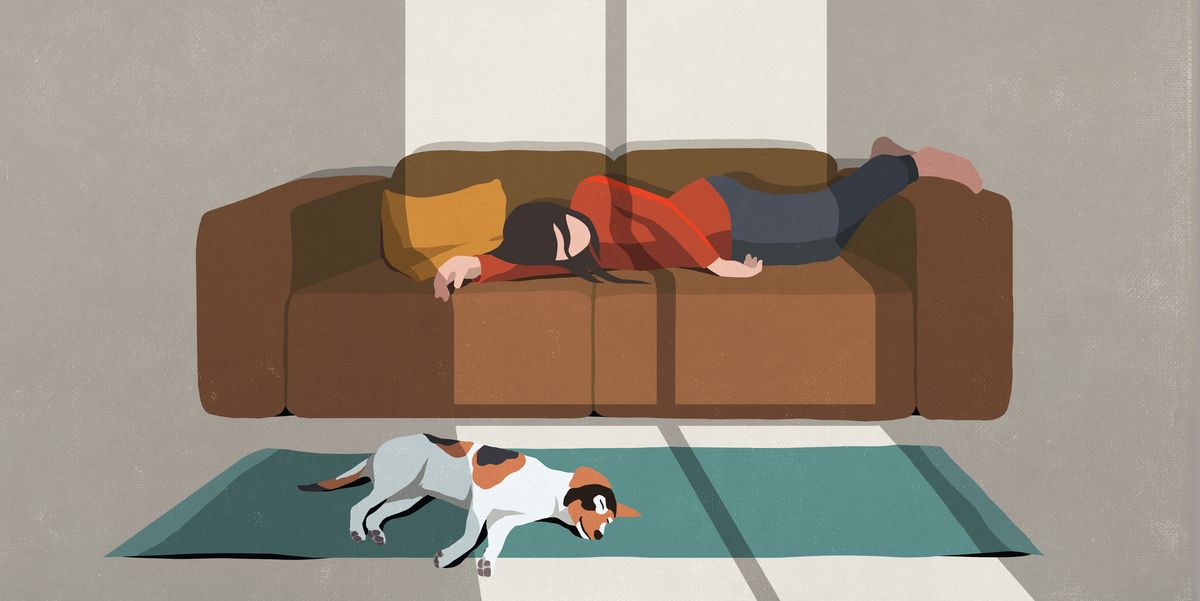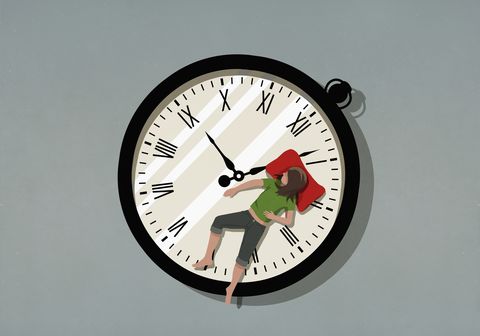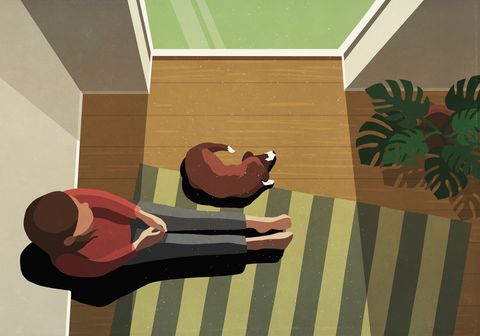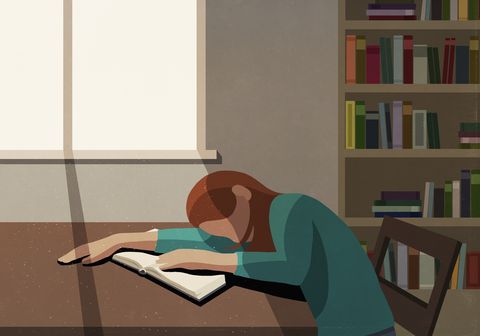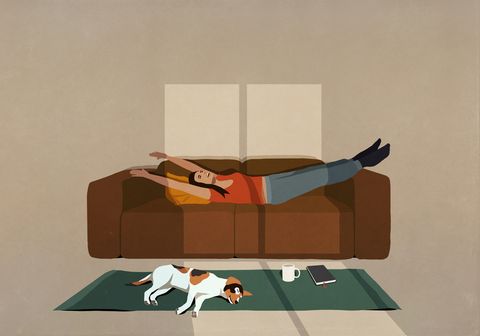Products You May Like
The man is an acquaintance. He brings me a drink. His hand glides over my ass with confidence. My stomach jumps. His lips are on mine. He says he loves me, asks me to run away with him. His car waits down the block, ready for our departure. Did he call me “mi amor”?
Hours later, my husband crouches next to me on our bathroom’s cracked black tile. I hear his voice. “What happened?” The softball-sized lump on my forehead marches toward my eyes. “My head hurts,” I say. He hugs me. My chest is covered in barf. I assume it’s my own.
When I start writing a novel, I know only how it will begin and how it will end. Trying to piece together what took place between the drink and the morning after reminds me of my early book-plotting process, when there’s nothing in the middle but blank pages.
The following days are a blur of naps in doctor’s waiting rooms and trips through tubes that snap pictures of my swollen brain. I’m prescribed rest. The timeline for any sort of recovery is essentially a shrug emoji. In September of 2020, my hibernation begins.
Sleep never felt so delicious. Vertigo from my rattled inner ear and headaches from the concussion twist minutes, hours, weeks, months into indistinguishable intervals. With the light hidden behind my blackout curtains, day and night mean nothing. At 7:30 p.m., the dog brings her empty food bowl, asking that it be refilled.
Meanwhile, the world continues outside my window. President Trump is hospitalized with Covid. The Senate confirms Amy Coney Barrett. Young people chant the names of George Floyd, Breonna Taylor, and Elijah McClain. Pfizer announces early vaccine results. I’d covered the 2016 presidential election as a journalist, but Joe Biden is elected without my hurried fingers over a keyboard.
I lie in bed, trapped in a kind of solitary confinement, my novelist mind running wild with potential character arcs. What if my body never heals? What if my brain is permanently damaged? What the hell happened?
AUTUMN
Daily Sleep: 22 Hours
Because I am both accident- and sickness-prone, or have what Victorian doctors once labeled “a weak constitution,” this was not my first brush with death.
I was born premature with an Apgar score of 1. As a toddler, I was attacked by our family dog and had to have my face reconstructed by a plastic surgeon. A few years later, my father accidentally sliced my forehead with electric hedge clippers. I broke my ankle stepping out of a van. I was once hospitalized with a rare and painful virus that caused my veins to explode. In most company, I easily earn the record for lifetime stitches (107 at last count).
In college I fell ill with what would eventually be diagnosed as a severe staph infection that had seeped into my bloodstream and joints. I awoke to my father crouched over my sickbed, pleading with his God to let me live. I had a fool’s confidence in my immortality and was starting an internship in Washington, DC a few weeks later. On my first day, I toured the Voice of America building with my new boss and prayed we’d stop walking before I fainted. I was still weak but didn’t want to show it. I pushed myself forward, as I had always done.
This time, though, my body and mind were waving a white flag.
My best guess as to what happened is that my drink was spiked. And then once I was back at home, while attempting to wash vomit off of myself, I must have slipped in the shower, sending my forehead on a high-speed collision course with the ceramic corner of our bathtub. A massive bump bloomed near the middle of my forehead, the spot many refer to as the “third eye,” or what ancient Indian tradition calls the “Anja Chakra,” said to be the source of inner wisdom and intuition. I was feeling the absence of both and had no desire to step outside into a world that was half-asleep itself.
All of my past traumas squatted stubbornly on my chest in the brief stretches of waking silence. They played table tennis inside my aching head, danced in odd shapes in front of my purple raccoon eyes. All I wanted was to curl up in my hibernaculum of blankets and pillows and fall back into warm, sweet sleep.
Before snakes sink into brumation, the cold-blooded version of a bear’s deep winter slumber, they shed their skin. Any protective barrier I’d been cultivating fell away the night I hit my head, the raw questions I’d spent a lifetime avoiding now exposed, demanding my attention. My body and the world were in the process of transforming, painfully, into something new. But reckoning with this sea change, both internally and externally, was too much. Like many of my pajama-clad neighbors, huddled in their homes playing Animal Crossing, I chose hibernation.
WINTER
Daily Sleep: 18 Hours
A new year, 2021, has started. I’m able to stay awake a few more hours per day. The doctors still can’t tell if my condition is mental, physical, emotional, or spiritual. I’m not sure it matters.
I’ve been cleared to read with frequent breaks and dive into books, seeking answers for what might have happened to me. In Gavin de Becker’s The Gift of Fear, I learn that would-be predators look for someone who will allow them to be in control, who will react to their advances with shyness or intimidation rather than directness and refusal. De Becker calls this process “the interview.”
Did the interview start when I let this man sip from my wine glass, weeks before the concussion? He worked at a restaurant that my husband and I frequented. We moved our meals to the patio when indoor dining restrictions began. When the man pecked me on the lips, I said nothing. When he invited me to come by before the restaurant opened, telling me it would be the perfect place to write while my husband was at work, I didn’t go, but shrugged off the offer as kindness. He even told me that he loved me.
I had come up with several rationalizations for his questionable behavior. He was from Europe! He greeted my husband the same way! He meant “love” in a hyperbolic sense, as in, he loved me as a customer.
After the concussion, I peppered women with questions and hypotheticals — what would you do if a European waiter at a restaurant you frequented kissed you on the mouth? Or hugged you too long? Or invited you to the beach with him?
Most said they would have done the same, i.e. nothing.
Since developing boobs as a pre-teen in the Evangelical South, I’d made a habit of freezing when confronted with a sexually awkward or threatening situation—I stared straight ahead when a family friend ran in naked as I was about to get in the shower, as middle school boys slipped their hands up my shirt, as grown men leered. Before my husband, my two longest relationships were with a man who regularly slapped me and another who confessed to breaking his mother’s ribs. I was an expert at ignoring.
The writer Melissa Febos describes a similar detachment from her body in Girlhood: “The same sense, when he touched me, that I no longer existed. Not girl, but vapor. My body a thing in his hands, my mind a balloon bumping the closet ceiling.”
Like many women, I could easily—poof!—dissolve into a ghost of a girl. So, I was not there when the server kissed me. Just as I was not in bed, recovering from a concussion. I was a spirit, invisible, easily slipping between this world and another, rising somewhere beyond thoughts and fears, between consciousness and unconsciousness.
Otherwise, the what-ifs would come tumbling back out: What if I had stormed out after that first kiss? What if I had yelled or pulled away or talked to the manager or never gone to that restaurant again? If the protagonist had done any of those things, would she have avoided getting roofied and falling in the shower?
In The Body Keeps the Score, Bessel van der Kolk explores how trauma rewires our brain’s alarm system; survivors of trauma are more likely to misinterpret safe situations as unsafe and unsafe situations as safe.
I’d spent a lifetime silencing every alarm in my body. Was this habit handed down from my mother, who was molested in a barn as a child? Was it passed to her and then to me like the perfect recipe for buttered lima beans and the whispered stories about our relatives in the Civil War? According to van der Kolk, the body stores these memories, whether our own or from generations past, in our cells.
SPRING and SUMMER
Daily Sleep: 14 Hours
Six months after the concussion, my puffed-out face is mostly deflated, the watercolors of my bruises have faded, my headaches occur less often. I’ve returned (remotely) to my work as a journalist, but spend my off hours taking naps that might be better described as three-hour comas.
I still don’t have a label for the man who set these events in motion—assailant? Abuser? Assaulter? Asshole?
I haven’t spoken with him or pressed charges. There is no proof of what happened, and I’ve been occupied with my injury. So while I nearly lost my life from our last encounter, he has only lost a customer. The cosmic unfairness of this difference taunts me as I watch him continue his life unbothered from my apartment window, serving outdoor tables and beckoning to passersby, menus in hand.
COVID-19 vaccines are widely available, but even with both doses, I’m hesitant to leave home. I’m told that when my husband swooped in to rescue me that night, he’d yelled at the man to stay away from me. I’m worried his threat won’t be enough. I also hate that I am a woman who needs to be rescued.
In July, I sign up for a women’s self-defense class. As I sit on the grass at Madison Square Park waiting for it to start, I listen to the sounds of a city slowly awakening—the bow strokes of a distant orchestra, friends catching up over wine in plastic cups, children playing on the monkey bars.
Following the instructor’s lead, I swing my elbow, imagining it making contact with a man’s jaw. I kick at a pretend groin with the confidence of the high school soccer star I once was. My fellow classmates and I scream at each other: “No!” “Get away from me!” “I don’t know him!”
But squashing a decades-long practice of capitulation is difficult. I’m reminded of when my accountant spread his arms, saying “I’m a hugger,” and how I did not want to hug my accountant but still dove into his waiting arms, how he held on too long, and how I didn’t pull away.
TODAY
Daily Sleep: 12 Hours
The bump on my head tormented me for the first year of my recovery, a permanent reminder every time I saw my face on a work Zoom or rested my forehead on the ground in Child’s Pose. I still, at times, require as much rest as a toddler, at least according to standard sleep charts. I’m working with a neurologist on this.
The bump is smaller now, but still there. My husband has taken to calling it my unicorn horn. To remove it, my doctors say they’ll have to peel back the skin on my forehead and sand down the place where my brain pressed against my skull.
Looking out the window of my new apartment, I can’t help but think that every person on the sidewalk below is suppressing their own tragedy from this time, a story that still needs to be shared and grieved. A line from The Body Keeps the Score stays with me, about how telling your story is one of the most important parts of healing and integrating a traumatic experience: “As soon as a story starts being told, particularly if it is told repeatedly, it changes—the act of telling itself changes the tale. The mind cannot help but make meaning out of what it knows, and the meaning we make of our lives changes how and what we remember.”
There is so much I want to tell, and even more I’m determined to change as I slowly make my way out there myself. For one, when a friend shares a story like this with me, I don’t want to nod sympathetically. I want to be able to say, with vigor, “What the fuck?”
Over the past year, as I’ve reunited with friends and family, I’ve told this story. With each telling, it gets a little easier, the lessons become more clear, and I need a little less sleep.
Today, I’m thankful to be awake. I ride public transit and carry pepper spray. I’ve even gone out to dinner by myself, though I will never go back to that cursed spot. My workplace is threatening a return to the office, and, amazingly, I’m ready. I practice my self-defense moves on my husband and tell myself to “get the fuck away” in the mirror. I remind myself to be nice to that unicorn-bump girl. She’s unlearning something important.
